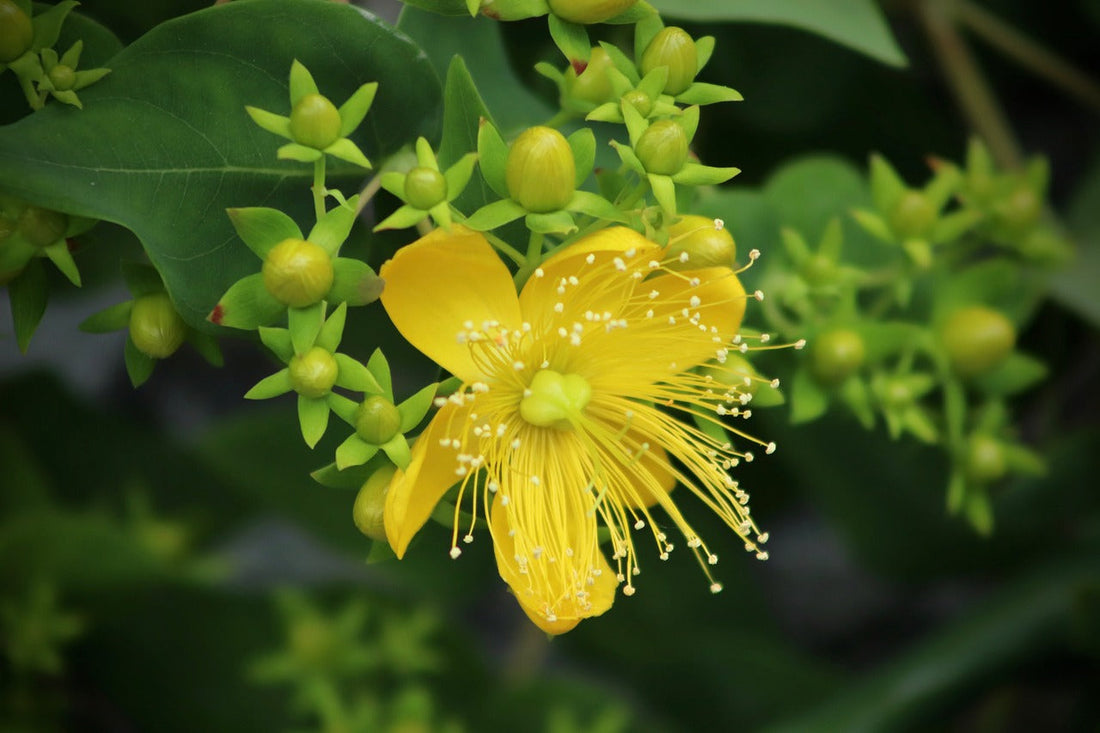St. John's Wort is a plant supplement often used to treat symptoms of mild depression, menopause, and PMS symptoms. You can find it in capsule form, filled with powdered leaves and flowers of the plant Hypericum perforatum.
Keep reading and find out if St. John's Wort is the right choice for you.
What is St. John's Wort used for?
Flowers and leaves of the St. John's Wort plant have many active ingredients. These active ingredients cause a boost in your levels of serotonin and dopamine, or the so-called hormones of happiness. This is why St. John's Wort can help with:
- Mild depression,
- Pre-menopause and menopause symptoms,
- PMS.
The usual dose of St. John's Wort is 300-400 mg three times a day. Taking St. John's Wort can cause headaches, stomach upset, dizziness, tiredness, and anxiety, especially in the beginning. Talk to your doctor or healthcare provider before taking any new supplements.
Did you decide to try out St. John's Wort? Great! You can purchase a quality St. John's Wort supplement from our website by clicking here.
To find out more about the mechanism of action of St. John's Wort and scientific evidence on its benefits, side effects, and the appropriate dosage, keep reading the article.
St. John's Wort - Mechanism of action
St. John's Wort is a plant with yellow flowers that got its name because it blooms around the time of St. John the Baptist's feast. The plant is native to Europe but can be found all over the world. The extract is derived from its flowers and leaves, and it can be formulated into capsules, tinctures, gels, and various other forms.
Roughly 20% of compounds extracted from St. John's Wort are biologically active, and they fall into several categories:
- naphthodianthrones,
- phloroglucinols,
- flavonoids,
- essential oils.
The most present and potent ones fall into the category of naphthodianthrones, such as hypericin, hyperforin, pseudohypericin, isophypericin, and protohypericin. St. John's Wort extract usually has up to 0.3% hypericin and hyperforin.
These compounds are responsible for St. John's Wort's positive effect on depression. They allow serotonin and dopamine to bind to their receptors, and the brain to function normally (1).
Benefits of St. John's Wort
Numerous studies have confirmed the positive effect St. John's Wort has on mild depression. One scientific article summarized the findings of more than 30 studies and concluded that St. John's Wort always had a significant effect in helping fight symptoms of mild to moderate depression, compared to a placebo. It also had a similar effect to common antidepressants (1).
The same was noticed in the case of PMS, where St. John's Wort helped with physical and behavioral symptoms (2). St. John's Wort also treated symptoms of menopause (e.g. hot flashes) and post-menopause (e.g. depression) (3, 4).
There is currently no research done on the effect of St. John's Wort on weight loss or improving skin conditions. However, that doesn't mean St. John Wort's is ineffective for any of these causes.
St. John's Wort - Side Effects
As mentioned before, the most often side effects of taking St. John's Wort are:
- headaches,
- stomach upset,
- dizziness,
- tiredness,
- anxiety.
Other than those, St. John's Wort can interact with medications like:
- SSRIs (selective serotonin reuptake inhibitors),
- MAO (monoamine oxidase inhibitors),
- oral contraceptives,
- anti-seizure medications,
- anticoagulants,
- anti-rejection medications,
- heart medications,
- Xanax (5).
The list is quite long so make sure to discuss taking St. John's Wort after talking to your doctor, especially if you're currently on some medication.
Can you take St. John's Wort long-term? We know so far that St. John's Wort is safe if you don't take more than 900 mg daily for up to 3 months. In doses bigger than those, you might have a severe skin reaction and be very sensitive to sunlight, so be careful.
Does St. John's Wort cause weight gain? Until now, no research has been done on the connection between St. John's Wort and gaining weight. However, St. John's Wort might help fight depression and weight loss connected to depression.
How much St. John's Wort should I take?
The usual dosage of St. John's Wort is 300 to 400 mg taken three times a day. You can take it every day for up to three months.
Literature:
1. Klemow KM, Bartlow A, Crawford J, et al. Medical Attributes of St. John’s Wort (Hypericum perforatum) In: Benzie IFF, Wachtel-Galor S, editors. Herbal Medicine: Biomolecular and Clinical Aspects. 2nd edition. Boca Raton (FL): CRC Press/Taylor & Francis; 2011. Chapter 11. Available from: https://www.ncbi.nlm.nih.gov/books/NBK92750/.
1. Apaydin EA, Maher AR, Shanman R, Booth MS, Miles JN, Sorbero ME, Hempel S. A systematic review of St. John's wort for major depressive disorder. Syst Rev. 2016 Sep 2;5(1):148. doi: 10.1186/s13643-016-0325-2.
2. Canning S, Waterman M, Orsi N, Ayres J, Simpson N, Dye L. The efficacy of Hypericum perforatum (St John's wort) for the treatment of premenstrual syndrome: a randomized, double-blind, placebo-controlled trial. CNS Drugs. 2010 Mar;24(3):207-25. doi: 10.2165/11530120-000000000-00000.
3. Na DH, Ji HY, Park EJ, Kim MS, Liu KH, Lee HS. Evaluation of metabolism-mediated herb-drug interactions. Arch Pharm Res. 2011 Nov;34(11):1829-42. doi: 10.1007/s12272-011-1105-0.
4. Eatemadnia A, Ansari S, Abedi P, Najar S. The effect of Hypericum perforatum on postmenopausal symptoms and depression: A randomized controlled trial. Complement Ther Med. 2019 Aug;45:109-113. doi: 10.1016/j.ctim.2019.05.028.
5. Abdali K, Khajehei M, Tabatabaee HR. Effect of St John's wort on severity, frequency, and duration of hot flashes in premenopausal, perimenopausal and postmenopausal women: a randomized, double-blind, placebo-controlled study. Menopause. 2010 Mar;17(2):326-31. doi: 10.1097/gme.0b013e3181b8e02d.








